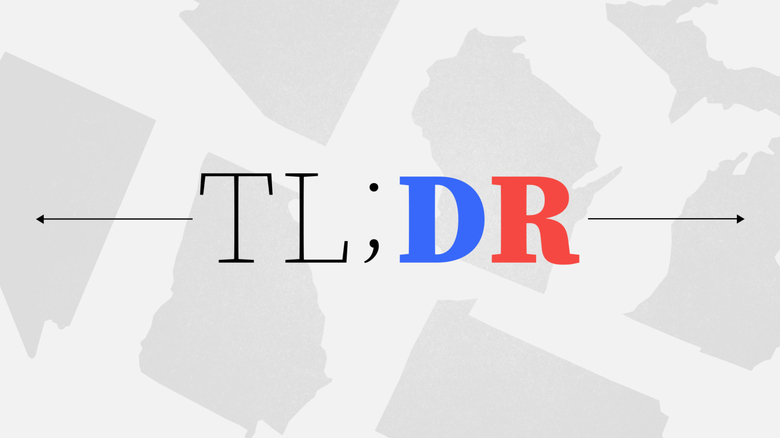Secretary of state contests — typically low-profile races that determine who helps administer elections in a state – have drawn national attention and millions of dollars in political spending this year as several Republican nominees who doubt the legitimacy of the 2020 presidential election pursue the jobs.
In all, voters in 27 states will choose secretaries of state in the midterms. Fourteen of those seats currently are held by Republicans and 13 by Democrats.
But the presence of election deniers on general election ballots in key battlegrounds has set off alarms for voting rights advocates because of the pivotal role these offices will play in affirming the outcome of future elections, including a potential 2024 rematch between President Joe Biden and former President Donald Trump.
And Trump, who attempted to pressure public officials to set aside the will of voters after he lost the presidency, has championed their candidacies.
“Even one being elected would be terrifying enough in a swing state,” said Nick Penniman, the founder and CEO of Issue One, a nonprofit group tracking these races. “We know that elections in America come down to 300,000 votes stretched across five or six swing states, so every vote counts.”
Here’s a look at 5 key secretary of state races:
Arizona
In Arizona – where election conspiracy theories have flourished ever since Biden won this traditionally red state by fewer than 11,000 votes two years ago – Republican voters picked state Rep. Mark Finchem as their standard-bearer.
More on voting rights
Finchem, who has described himself as a member of the far-right Oath Keeper’s group, scored Trump’s endorsement back in September 2021. The GOP lawmaker has lobbied to toss out the results of the 2020 election in some of the state’s largest counties – including Maricopa, home to Phoenix, where a widely derided review of ballots ordered by Republicans in the state Senate still concluded that Biden had won more votes than Trump did.
In the state legislature, Finchem cosponsored a bill that would have allowed lawmakers to set aside election results. And before this year’s primary, he joined Arizona gubernatorial candidate Kari Lake in a failed legal bid to end the use of machines to record and count voters in the state’s elections.
He faces Democrat Adrian Fontes, the former top election official in Maricopa County. He lost his reelection bid as county recorder two years ago.
During a recent debate, the two sparred over the 2020 election, with Finchem arguing that the election in some counties had been “irredeemably compromised” and should be set aside.
Fontes countered that Finchem’s conspiracy theories have served to erode Arizonans’ confidence in their elections and in their fellow residents.
A CNN poll earlier in October found the contest within the margin of error, and one Democratic group recently committed $5 million to the race to boost Fontes, who has lagged behind Finchem in fundraising.
Georgia
The Georgia contest features one of the country’s best-known election chiefs – Republican Brad Raffensperger, who refused Trump’s request to “find” the votes needed to overturn his loss in the Peach State. (That campaign by Trump and his allies is the subject of a special grand jury investigation in Fulton County, Georgia.)
Raffensperger’s famous rebuff – and star turn as a witness before the House select committee investigating what led to the January 6, 2021, attack on the US Capitol – have burnished his reputation as a defender of election integrity. And in May, he pulled off a major political upset by beating his Trump-endorsed challenger, Georgia Rep. Jody Hice, outright in the primary without needing to win a runoff.
“I’ve had to stand up to incredible pressure,” the Republican said, during a recent candidate debate. “Many people buckled and folded. I didn’t, and I won’t.”
Raffensperger’s national profile has made him a tougher target for the Democratic nominee, state Rep. Bee Nguyen, who has been rising political star in her own right.
She has put expanding access to the ballot at the center of her candidacy. She also is seeking to make history by becoming the first Asian-American elected to a statewide political office in this increasingly racially and ethnically diverse state.
Nguyen has taken aim at Raffensperger’s support for an election law enacted last year that imposed new restrictions on voting and has seized on his views on abortion in an attempt to gain ground.
When he was a state lawmaker, Raffensperger sponsored a resolution that proposed a constitutional amendment to recognize “the paramount right to life of all human beings as persons at any stage of development.”
The Republican’s campaign aides have argued that Raffensperger’s position on abortion is not relevant to the job he now holds.
During the televised face-off with Raffensperger and Libertarian Ted Metz, Nguyen said: “I’m the only candidate on this stage who is both pro-choice and pro-democracy.”
Michigan
The race pits the incumbent, Democrat Jocelyn Benson – a leading national voice countering election denial – against Republican Kristina Karamo, who has made false claims about the 2020 election and who was behind the January 6, 2021, attack on the US Capitol.
Karamo, a community college professor who secured an endorsement from Trump last year, has said he won the election, and she signed on to an unsuccessful Supreme Court lawsuit that challenged Biden’s victory in four states.
Karamo – along with Finchem and several other Republican nominees – have joined a coalition of so-called “America First Constitutional Conservative” candidates, who have pledged to ban mail-in ballots, expand voter identification and eliminate early voting.
Benson has argued that the future of democracy is at stake in the contest and has publicly described fearing for her family’s safety after she defended the legitimacy of the 2020 election. At one point, she said, armed protesters gathered outside her home and shouted obscenities over bullhorns as she settled in to watch a Christmas movie with her four-year-old.
Republicans in the state have criticized Benson for her decision to mail absentee ballot applications to every voter in 2020 during the pandemic, but courts have upheld her authority to do so. And hundreds of post-election audits have confirmed the accuracy of the 2020 election.
In addition, a GOP-led state Senate investigation found no evidence of widespread fraud.
Minnesota
In Minnesota, Republican lawyer Kim Crockett is challenging Democratic Secretary of State Steve Simon.
Crockett would like to increase in-person voting, reduce the state’s current 46-day window of early voting and require that voters show ID to cast ballots in the state, which is not currently required for active voters under Minnesota law.
As it does in several other states, some of the debate in this contest turns on whether it was appropriate to expand voting options in 2020 as the country faced a once-in-a-century pandemic.
As CNN’s Daniel Dale has reported, Crockett said she agreed with an interviewer who cast the 2020 election as “illegitimate” because of the pandemic-related changes to election procedures.
Republican lawmakers objected to Simon striking deals with litigants during the pandemic to drop the requirement that voters casting ballots by mail find another registered voter to witness their signatures.
In a sign of Democrats’ concerns about holding the seat, national groups affiliated with the party are spending millions to help Simon win a third term.
Nevada
In Nevada, Republican Jim Marchant – a former state assemblyman who organized the coalition of America First candidates – and Democrat Cisco Aguilar are vying for an open seat in what has emerged as one of the more competitive secretary of state contests in the country.
A recent CNN poll found 46% of likely voters back Marchant with 43% behind Democrat Aguilar, within the poll’s margin of error.
Latest election news
The current officeholder, Nevada Secretary of State Barbara Cegavske – a Republican who defended the legitimacy of the 2020 election and Biden’s win in the state and was censured by the state GOP for doing so – is term limited.
Aguilar is a Las Vegas attorney and former staffer for the late Sen. Harry Reid, the former Senate majority leader. Aguilar held several high-profile posts, including working as general counsel to the management company tied to tennis greats Andre Agassi and Steffi Graff.
On his website, Aguilar said he wants to “remove barriers to voter participation” and make elections transparent to “to maintain the public trust.”
But Marchant has drawn more national attention than Aguilar with his outspoken activism. Marchant has fed distrust of voting machines and encouraged county commissions in the rural reaches of the state to hand-count ballots – a practice critics say could lead to errors and delays in delivering results.
Marchant also called for an end mail-in voting in the state – which the Democratic-controlled state legislature permanently expanded last year – despite voting by mail many times himself, as CNN’s KFile recently reported.
In 2020, Marchant ran for Congress, lost and sued in an unsuccessful attempt to overturn the results. He alluded to that earlier in October when he joined Trump on stage at a rally in Minden, Nevada, and claimed both men had fallen victim to a “rigged election” two years ago.
And he said that if he and other like-minded candidates win secretary of state races in November, “we’re going to fix the whole country and President Trump is going to be president again in 2024.”
Other states
In two other battleground states, the results of governors’ races could influence how future elections are administered.
Pennsylvania
In Pennsylvania, a state Biden flipped two years ago, the race to watch is the governor’s contest between Democrat Josh Shapiro and Republican state Sen. Doug Mastriano because the winner will appoint the next secretary of state.
Mastriano – who currently trails Shapiro in the polls – has said he could decertify every voting machine “in the state with a stroke of the pen.” The retired US Army Colonel also has said that if elected, he might “reset” voter registration in Pennsylvania and make everyone re-register if they want to vote again – a move legal experts say would violate federal law.
Wisconsin
Currently, the Wisconsin secretary of state does not oversee elections.
But some Republicans in the state, including with GOP secretary of state nominee Amy Loudenbeck, want to reexamine the authority of the bipartisan Wisconsin Elections Commission, the agency that currently has that power. Republicans have sharply criticized the six-member panel for its decisions that eased voting rules during the pandemic.
Some Republicans, who are expected to retain their control of the state legislature, are looking to transfer at least parts of election oversight to the secretary of state if Loudenbeck wins and the party flips the governor’s office, currently held by Democrat Tony Evers. Evers has consistently vetoed bills that seek to change election policies in the state.
Loudenbeck faces Secretary of State Doug La Follette, a Democrat who has spent more than four decades in the job. La Follette has said he wants the commission to retain its election management powers.




